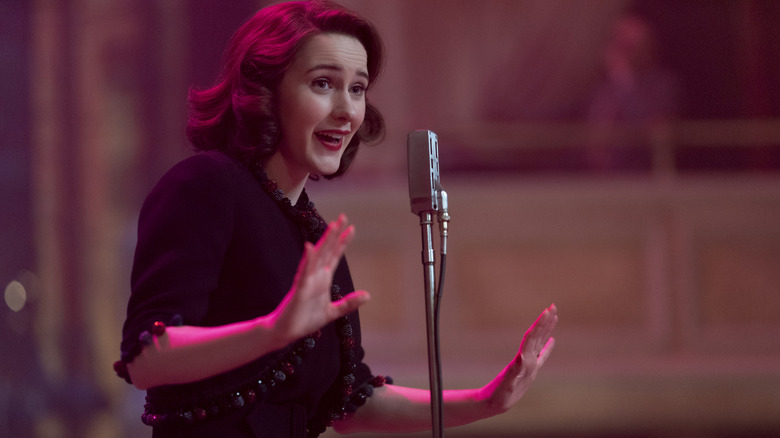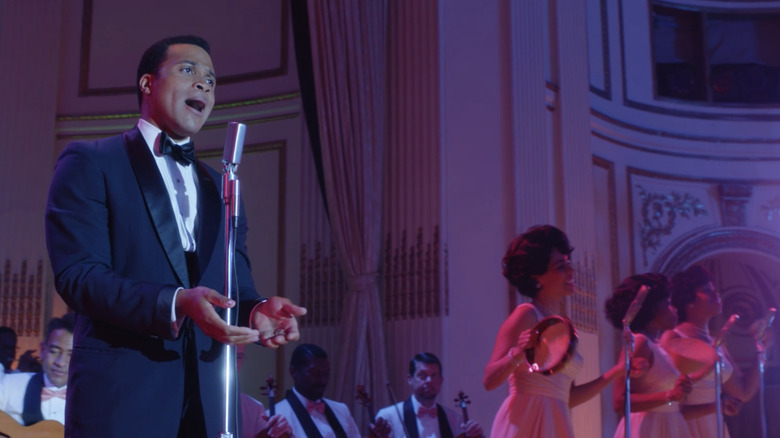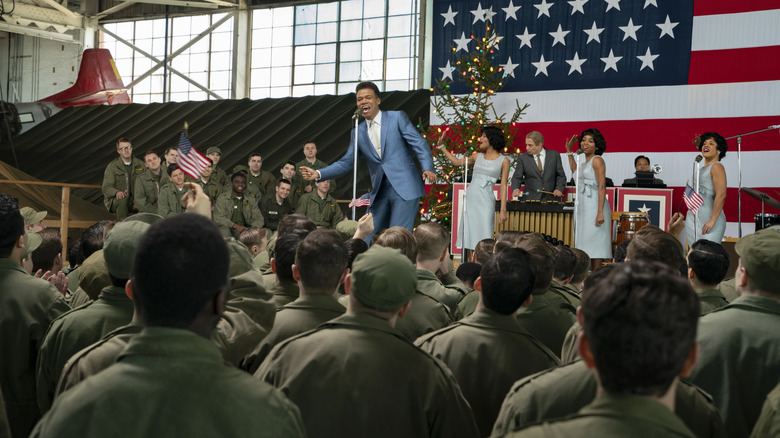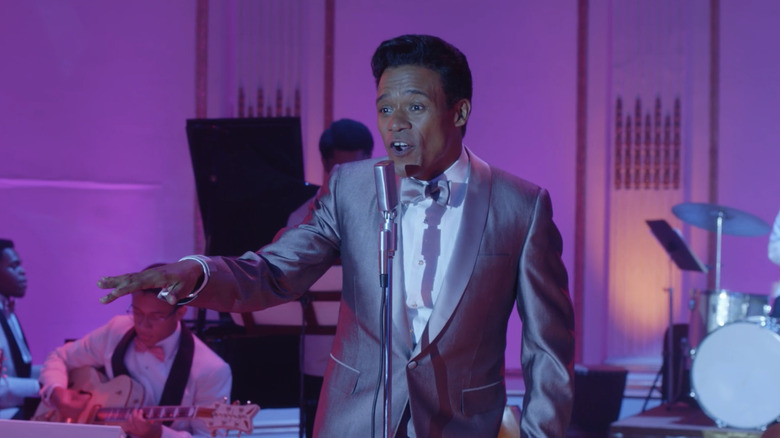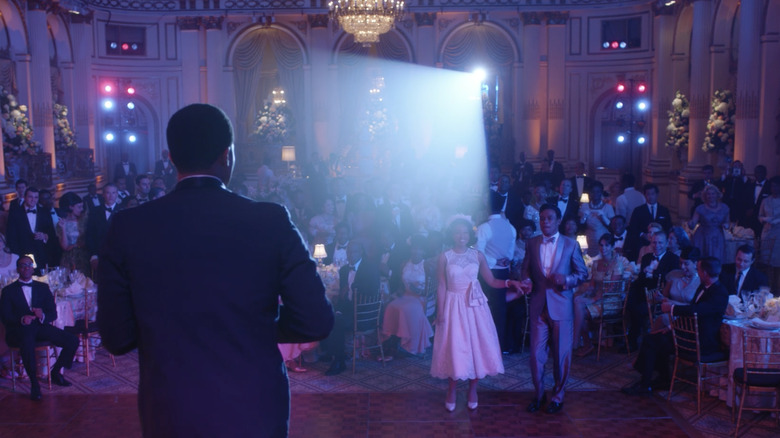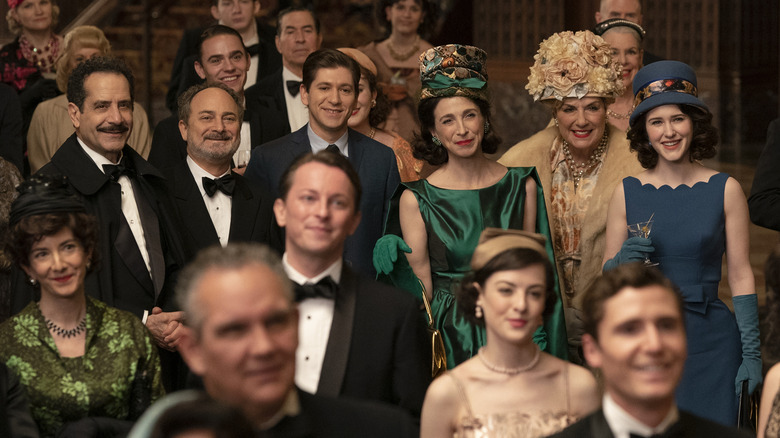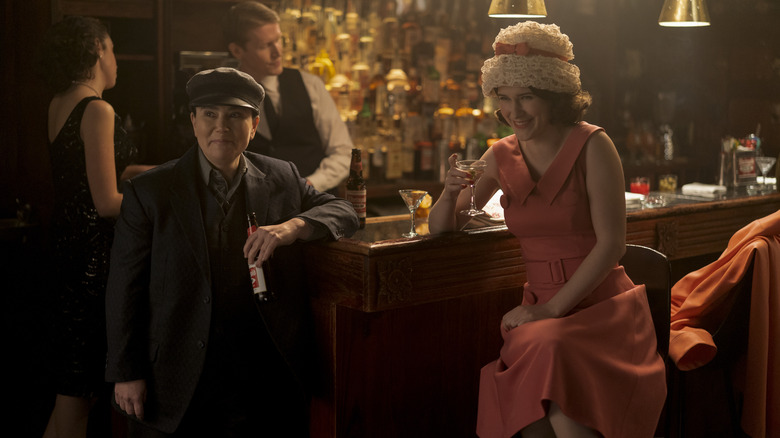Songwriters Mizer & Moore Break Down The Original Music Of The Marvelous Mrs. Maisel [Interview]
Fans of "The Marvelous Mrs. Maisel" are well accustomed to ending an episode with a song stuck in their heads. Amazon Prime Video's hit series can't let the clothes do all the work, so it also throws audiences back into 1960s New York with the help of a nostalgic, swinging soundtrack, featuring everyone from Fred Astaire and Barbra Streisand to Nina Simone and Ella Fitzgerald. Back in its third season, "Maisel" took its atmosphere to the next level with its first batch of original songs, courtesy of the musical magic of songwriting duo Thomas Mizer and Curtis Moore. A composing and storytelling team with theatrical roots, the pair are behind the bubbly yet vintage sound of sultry-voiced superstar Shy Baldwin (Leroy McClain, with singing courtesy of Darius de Haas). Along with an Emmy nomination for the fictional singer's hit song "One Less Angel," their work on season 3 no doubt led to millions of people humming the same catchy tune and desperately wishing Shy Baldwin had an actual backlog awaiting us on Spotify. Fortunately, "Maisel" brought original music back for its fourth season.
It seems that series creator Amy Sherman-Palladino has a penchant for requesting the seemingly-impossible: Last season, she asked Mizer & Moore to craft a '60s hit, thus gifting the world with "One Less Angel." This year, her simple requests included another Shy Baldwin hit, an original song that would fit into three-time Grammy winner Harry Belafonte's repertoire, and an ensemble number for a fictional Broadway musical. And since nothing is impossible in the marvelous world of "Maisel," the songwriting duo delivered, composing various originals for season 4. In our conversation below, Mizer & Moore talk through the three big songs of season 4, and the future of their work on "The Marvelous Mrs. Maisel" as the show enters its final lap.
This post contains spoilers for season 4, episode 6 of "The Marvelous Mrs. Maisel."
'We come from the background of theater, so we're constantly thinking in-story'
I feel like you two have been given a lot of impossible-seeming tasks for this show, like pulling a pop star from thin air and writing a Broadway hit.
Curtis Moore: It's been hilarious. We have had the most insane requests. As Tom will often say, it's anybody's guess what the request will be that we get for the next song we have to write.
Thomas Mizer: Sometimes Amy calls us up — Amy Sherman-Palladino, the creator of the show — and we'll laugh, and we'll talk, and she'll tell us what she wants next. And then we'll hang up the phone and be like, "This is a joke, right? She is punking us."
Moore: Totally punking us. A couple of years ago when she called and said, "We just need a number one hit for Shy Baldwin." Okay, easy. We'll just write a number one hit.
Mizer: People spend their whole lives trying to do that.
So what was your reaction to the Harry Belafonte request?
Mizer: That was super intense. That was actually probably the hardest thing we had to do for the show, because he's iconic. And his catalog is so deep and well known. We wrote probably more songs for the options for it before we found the right song than anything we've ever done for the show, because we were just struggling to figure out what it would be. And the question it came down to is, why is he singing an original song at this wedding? Why wouldn't he sing one of his famous songs?
Moore: What's interesting is that when we're writing for Shy Baldwin, or The Silver Bells, those are fictional characters that we are creating, and we're creating their sound. Amy and Dan Palladino give us really strong thoughts and ideas. They're great with music. But ultimately that's a fictional character. We create that. But now we're being asked to write this Harry Belafonte song, which is just a very different world for us.
As Tom was sort of hinting at, when we are writing for "Maisel," for every song that's in the show, we've written three or four other ones just to get us to find the right angle in. What's going to be the most appropriate for that moment? And for the song that we ended up coming up with, "Maybe Monica," we wrote probably six or seven songs, just trying to find the right angle for it.
Mizer: Then we talked to Amy, and she gave us the best note. She said, "This isn't one of his pop songs. This is a toast. It's a wedding toast. He and his band got together and decided to have fun and write a song for Shy, teasing him, playing with him, playing with his bride." Suddenly it became something we felt we could do. Like a band getting together and coming up with some jokes and playing with this friend as a toast. Instead of trying to create something that was Harry Belafonte, it was more like, hey, a bunch of friends getting together in the style of his other songs and giving their friend a good ribbing at the wedding.
So then that was the answer to the question that you had — "Why wouldn't he sing one of his famous songs?"
Mizer: Yeah. Because there's no reason to write — Harry Belafonte's music is so specific and so wonderful and iconic, there's nothing we can contribute to that. But this, when it's character and story-based, that's when we can jump in and have fun.
Moore: Right. Obviously, if you've watched the series, you know what happens with Shy Baldwin's character. One of the things that Tom and I love to do, even though we're songwriters, we're also storytellers. We come from the background of theater, so we're constantly thinking in-story. And then to work with Amy and Dan on this, we are constantly trying to put a little bit of twist of story in all the songs we write as well. So they're not just a standalone song, but they're also integrated into what's happening in the plot. This is a great example of being able to do that in this moment.
'When we're writing for Shy Baldwin, we were given "anywhere between Johnny Mathis and Sam Cooke" ... But Harry Belafonte's Harry Belafonte'
I remember you saying that a couple of years ago, about writing "One Less Angel" for Shy, that you had a specific mandate of Johnny Mathis and something along those lines. Did you have a similar directive for what this Belafonte song would sound like, or was it just his whole backlog?
Moore: We certainly listened to — I mean, I love him, so I know his stuff really well, and it was great to sort of get back into it again. Every time we do this, we sort of immerse ourselves in it. When we're writing for Shy Baldwin, we were given "anywhere between Johnny Mathis and Sam Cooke," which, it's a huge range there. But Harry Belafonte's Harry Belafonte. So that was a lot more like, "Okay, we have to fit ourselves in this pocket while also still being proudly part of the 'Maisel' world," you know what I mean? Everything is turned up to like an 11. Lights, and costumes, and sets, and dialogue, and so we want to kind of play in that as well. So we're kind of playing, I think that was kind of the angle we were taking with that song.
When you had all those other different versions or different songs, what was the deciding factor? Why was "Maybe Monica" the one?
Moore: In a way, and Tom, you tell me if you think that you agree, I think in a way it was the most fun. I think as writers and as people that are working in this world, we can get sort of bogged down with lots of ideas and concepts and trying to do lots of different things. At the end of the day, it's in the show, it happens one time, really quick in the sequence, so we really wanted to have a thing that landed, was hooky, and really was fun. This was the most fun when we finally sort of released ourselves and just wrote this really fun number that we could have a good time with, that kind of clicked for us. I think it felt right for us, and then it obviously felt right for Amy and Dan and the team, because they also picked that song. So that felt good for us to have cracked that moment.
Mizer: Unlike the other songs we were working on that felt more like trying to be a hit record, this one felt loose. It felt fun, and loose, and "after hours" to us. Giving ourselves the freedom to feel like, this is them after hours getting to play, still with the rhythms and tones of his music, but getting to be looser with it and more playful. That was what came through, and hopefully comes through in the sequence in the show.
'You can listen to it as just a pop song and a fun moment, but hopefully there's just that little bit of pathos and emotion beneath it'
Friday's episode brought us back to Shy's whole arc and picks up his story. So when you got another Shy assignment, did it feel easier because you've been writing songs for him for a while now?
Moore: No, I mean, in a way, it's more of a challenge. First of all, we don't know the story until they know the story. So we were told what was going to happen really late in the process. It's Shy's wedding, so this was a big deal. And given that assignment, we sort of were like, "Oh gosh, he's singing a song to his fiancée, soon to be wife" — or actually, I think they've just gotten married. I can't remember, but either way, it's the wedding ceremony. And so we have to come up with a development from "One Less Angel." So "One Less Angel" was his big coming-out hit. No pun attended there. And now we've got to write his next big ... it developed a little bit more. He's moving directions a little bit, and I think we were trying to give him that forward momentum as he would have in his career.
Mizer: There were a couple of competing factors. One, just the pressure on us. The response to "One Less Angel" was so lovely and people seem to really enjoy it so much. So now we're like, "Okay, how can we top that, if possible?" And second, this is his next album. So musically, he should progress. And we thought, as he moves into the '60s, he's going to want to be a little more Sam Cooke than Johnny Mathis. He's going to want to sit into a more R&B soul kind of world. Start to move that direction.
There was a line in an early outline or script that we saw, and I don't even know if it made into the episode, but it mentioned that Reggie, his manager, had written a song. And that sort of popped for me. I was like, "Ooh, this is Reggie, who's his dearest oldest friend, but what they've been through is kind of rocky, writing a song for his best friend about who's the person he wants to come home to." And you can listen to it as just a pop song and a fun moment, but hopefully there's just that little bit of pathos and emotion beneath it, of Shy's having to do this as a publicity thing. But underneath it, who's he really singing to? I don't know.
Moore: Yeah. I think you're right, Tom. I mean, I think I know who he's singing to. [Laughs] I think you know who you think he's singing to, but that it is exactly that. We're trying to get all of those things in the song. So it's still his next single, but at the same time, we, as storytellers, are trying to layer it with a little bit of extra storytelling.
It's funny because when I realized that we're back with Shy, I was disappointed that we weren't catching him at a concert or something, because I was like, "I want to hear him sing again!" But then he just jumps on stage at his own wedding –
Mizer: Right?! It's so awesome because –
Moore: We actually haven't seen the episode.
Mizer: We haven't seen it, so we don't know how it was finally cut.
Moore: We have to see it with everybody else, which is hilarious. So I'm excited. I was actually, we were there at the taping. It's interesting. When we filmed that episode, that was the first time I'd been with people after Covid, and this was, I guess we filmed almost exactly a year ago or maybe a little bit less than a year ago. It was probably last April. And it was filmed in New York City in this big ballroom. And just to be in this space with 400 extras, I was like, "Wow, here we are post-Covid, and yeah, it's really a nice treat that he gets to sing, and I'm really glad they brought him, and therefore Darius [de Haas], back to have a little moment."
'The details ... Everything about that show is transporting'
Can you talk more about that day and that performance?
Moore: Oh, I mean, it's always great to see that happen. It's such a wonderful thing. What's so awesome about "Maisel" is that they have the live band on stage. We've obviously prerecorded it in a studio, but many of the same musicians are there playing it live on screen so that it gives a real authentic feel to it. You're not going to see some random person. They're going to be playing the notes that are actually in the arrangement we did. And then also, storytelling-wise, they make these big gestures with these set pieces, these set moments. You've got to be there to believe it.
It's just so beautiful to see this all come together, and to have your two songs happening at the same time. First, we had the Shy Baldwin moment, which was also fun because this time, as you saw in the episode, it's wrapped around his introduction and his speech. He kind of comes in and does a dance. And likewise, "Maybe Monica," which follows, it's all one great little concert he does at his wedding, and probably really was for his career. You know what I mean? But yeah, that day was an incredibly great day. We had a lot of fun being there.
Mizer: The details. I mean, just being on the set, everything about that show is transporting. We have pictures of the gifts piled up on the table, and everyone's got little handwritten notes, to Mr. and Mrs. Shy Baldwin. I mean, stuff that you'll never see on camera, but it creates this complete world. And we hope that the music just adds to all of those elements that just transport you.
Absolutely. So then the third song that's in the season, "They Came, They Danced." I know that you have musical theater roots, but I imagine writing a song for a musical from the '60s is very different from writing musical theater from 2020.
Mizer: Especially because we had to write a bad musical from the '60s. It's not supposed to be the greatest musical, so it's fun to be bad. It was a joy to go back to our roots, and you only hear the song in the background, but the best part about it, sort of, Curtis was talking about is, we got to bring in some of our favorite Broadway talent to come sing it. And this was last year. Theater had been closed down for a long time, and there was no end in sight. We got to bring some of our favorite singers from Broadway, who were out of work, into a room together. There were tears, there was laughter, and we just recorded this silly, silly, fun song for a day, and got to escape into that world for a little bit, which was, whatever it does in the show, and I think people will enjoy hearing the whole thing on the album, I think for us, it's just going to be a personal moment of knowing we got to spend that day and give people a little bit of fun during a tough time.
Moore: And it's also interesting. That song, when we were told there was that musical, all we were given was the title. And we kind of knew that it was the character from the Catskills resort. So we kind of came up with an entire musical in our mind because they didn't know yet how the music was going to work and how the song was going to work. So we actually, again, we wrote about four or five songs from that musical.
Mizer: We were ready to stage it.
Moore: Yeah. Tom said the other day, we could do a co-pro with the fake "Smash" musical. We can put them together. But it was really fun to do all those songs. And so we basically have this fake musical that we wrote, and yeah, it's a blast. It's so silly.
'It's the only good song in an otherwise bad musical'
So how do you write a song for a bad musical? What are the markers of that?
Moore: Well, it's interesting. This song, the way it's written in the script is, it's the only good song in an otherwise bad musical. And the joke of the show is that Abe says, "This is the only good song ... and then they reprise it like five times." So you imagine you're seeing a show where they're just singing the song every five minutes. So in the song itself, we used the hook a thousand times as part of the joke. We just say it like –
Mizer: A hammer to the head.
Moore: And oh, "They came, they danced." We just threw it in there as many times as we could. The funny thing is, I feel like sometimes — I mean this in the best way — but the best musical is just teetering on being terrible at the same time! It's such a balance, you know what I mean? And sometimes you get it right and sometimes you don't. And I think we just sort of fell back on, we wanted to write a really funny, patter, energetic song that kind of threw the whole plot together and had a whole bunch of people singing very different things. So we gave everybody different solos, and it's just a fun music theater moment.
Mizer: Yeah. I got to indulge in leaning into some ridiculous rhymes that I probably wouldn't do normally. I rhyme fiancé, I have someone say fianced to rhyme with danced. Things like that, that are just silly and fun. And they sing the phrase "cabbage rolls." I mean, how often am I going to get to do that in my life?
Moore: I know. And we got to work with David Chase, this amazing arranger, Broadway, and TV guy. And just to make it even more authentic, he's just a genius when it comes to this kind of style. So he knows exactly how to make it just fit right in that pocket.
There's also a great line. I think it's Abe's entire review, which is just, "A musical your mother would like."
Moore: [Laughs] That's so true.
Mizer: [Laughs] That is it. That's what we're aiming for. It's like, we had listened to a lot of different composers from the era. I mean, we're musical theater people, so we didn't have to do research, we knew these people. And we all decided with Amy that the writer of this musical probably had been obsessed with Rogers and Hammerstein all through the '50s. And so he's ripping off Rogers and Hammerstein. So we thought about, "What is a bad Rogers and Hammerstein big number?" and that's kind of what we ended up with.
You've really run across all different the genres of music that were in the '60s. Is there anything tying all of these different songs together, or has it been like starting from scratch every time?
Moore: I mean, we go so fast, and we've now been living in this world for three-plus years, four years. And it's just been utter joy to be there. So I think we have been able to sort of jump into things quickly, but every time we do, it's always new. It's really rare that we can go back and be like, "Oh, we wrote all those great songs before, let's use one of them here." I can't tell you what they are, but the assignments we've been getting for season 5, which is what we're doing right now, I mean, literally right now, have been out of this world and so hilarious that we're just like, "Oh, that is not at all what I thought we'd be doing." So it's always an interesting challenge and one that we love doing. Everything does feel like it's totally different.
Mizer: I think if you had asked us what we'd be doing in our career, the last thing we probably ever would've suspected is that we'd be writing some '60s stripper numbers, but we had to do some of those this season too, so who knows what's next.
'I've always said that Maisel was a stealth musical ... if we could get some of the lead cast to sing, that would be pretty amazing'
You already answered my last question, which is, will there be music next season?
Moore: Yes. There will be music. And there's a lot of it.
Mizer: Before we got on, literally seconds before we were talking to you, we just sent a track for approval. So fingers crossed there. You never know what ends up in the final episodes, but we're in it now. I've said before, we are at the top of the rollercoaster and we're staring down at the season going, "Whoa, here we go."
I'm guessing there's a lot more range? Another crazy assignment like Harry Belafonte, or a Broadway musical?
Mizer: I think Amy and Dan are musical people. I mean, Dan has the biggest music collection and has such knowledge of such interesting random bands from the '60s that he just, he knows. And Amy is a Broadway baby. I mean, she was a dancer, she loves Broadway, and so they're always going to think in musical terms. I've always said that Maisel was a stealth musical. Really, when you look at the bones of it, how they use music, it's a musical.
It's felt like that all along, which is why it was so exciting to get the music in there. It always feels like everyone's a second away from bursting into song.
Mizer: It's true! I mean, that would be our dream. Someday, if we could get actually, I don't know if Rachel [Brosnahan] can sing, but if we could get some of the lead cast to sing, that would be pretty amazing.
Moore: We're going to push for that for next season, which is sweet.
Or just spin it off. "The Marvelous Mrs. Maisel: The Musical."
Moore: Right?
Mizer: From your lips.
Moore: Come on, yeah. We'd love it. It writes itself.
Mizer: That's how we met Amy, actually. We were working on a stage musical together. We got paired up on a blind date, a writing date by a producer who thought we might work well together. And this was before "Maisel." And we started working on a Broadway musical idea and unfortunately one day she came to us and said, "I've got to work on this Amazon show. It's just this little show I've got to work on for a couple months. No one's going to watch it. We'll get back to the musical when I'm done."
Moore: And that was "Maisel," so...
Mizer: [Laughs] We have not worked on the Broadway show for a little while.
Season 4 of "The Marvelous Mrs. Maisel" is now streaming on Amazon Prime Video.
